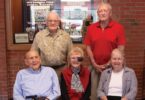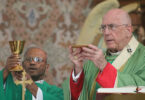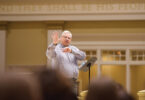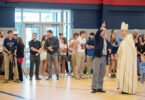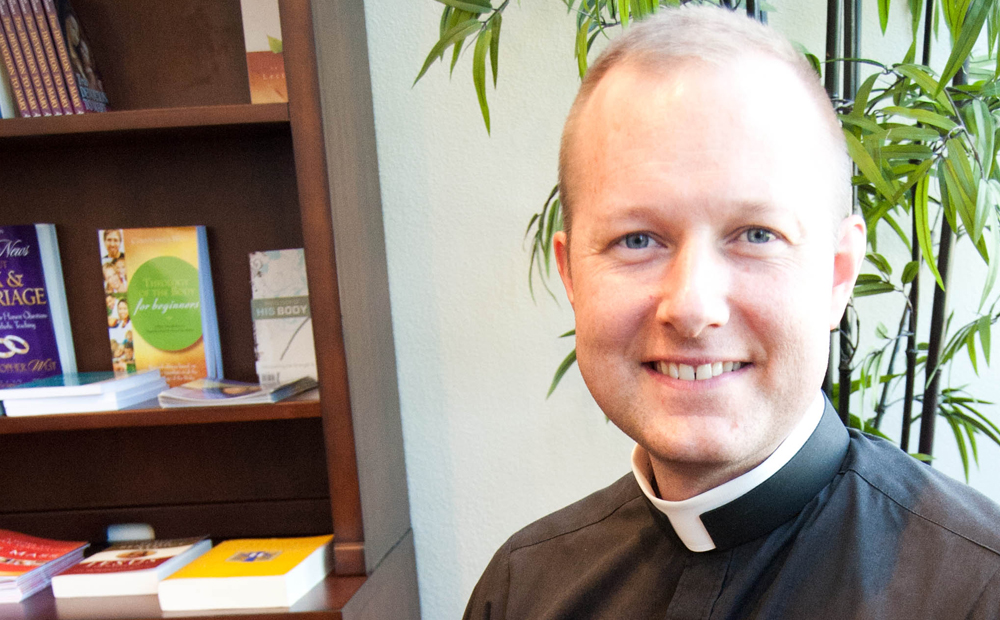
Leaven photo by Joe Bollig
Father Brian Klingele will join the Air Force in August. While he will remain a priest of the archdiocese, he will also be a part of the Archdiocese for the Military Services, USA.
Father Klingele joins ‘Team’ Air Force
by Joe Bollig
joe.bollig@theleaven.org
KANSAS CITY, Kan. — Father Brian Klingele might be changing uniforms, but he’ll still be batting for the same team.
In August, Father Klingele, pastor of Holy Angels Parish in Garnett and St. John the Baptist Parish in Greeley, will trade in his black clericals for the blue uniform of a U.S. Air Force chaplain.
On Aug. 25, he will report to Maxwell-Gunter Air Force Base near Montgomery, Ala., for five weeks of commissioned officer training. After that, he will undergo a basic chaplain course at Fort Jackson, S.C. Father Klingele’s first assignment will be with the 55th Air Wing at Offutt Air Force Base near Omaha, Neb.
Father James Ludwikowski, pastor of Good Shepherd Parish in Shawnee and a retired Air Force chaplain, swore Father Klingele into the Air Force with the rank of captain on April 10 at Savior Pastoral Center in Kansas City, Kan. Father Klingele, 37, will remain a priest of the archdiocese during his three-year period of service, but he will also be part of the Archdiocese for the Military Services, USA.
The decision wasn’t exactly a bolt from the blue.
“It’s something I’ve thought about for a little bit, off and on, for at least eight years, but not in depth,” said Father Klingele, who was ordained in 2002. “I’ve looked up information about it.
“But really, it was the last year and a half that I more prayerfully, more seriously contemplated this.”
There were two key factors that finally pushed him forward: He felt the call — and he saw the need.
“Ultimately, in my prayer and spiritual direction, I came to the point that I felt it was God’s calling for me to do this, a vocation within a vocation,” he said.
More than a year ago, Archbishop Timothy P. Broglio of the Archdiocese for the Military Services, USA, asked his brother bishops for their help in ministering to the vastly underserved military and diplomatic community of Catholics for which he is responsible.
“[Archbishop Broglio’s] archdiocese is the whole world, all the U.S. military and U.S. embassies,” said Father Klingele. “He [talked about] the difficulties caused by the lack of priests in the military.”
Father Klingele’s fellow commissioned officers will be other chaplains, attorneys, nurses, doctors, engineers, and other persons who already have degrees and professional experience needed by the Air Force, said Father Kerry Abbott, director of vocations for the Archdiocese of Military Services, and a 24-year Air Force veteran.
Father Klingele’s stint in Alabama, said Father Abbott, will serve as his introduction to military life.
“It’s a ‘bluing’ process — to help him understand what it is and how to be an Air Force officer,” said Father Abbott. “There will be military history courses, physical training, and what it means to be a leader in the Air Force.”
His subsequent training at Fort Jackson will teach him what it means to be a military chaplain and help him understand the expectations and responsibilities, said Father Abbott. In many ways, the role of a priest-chaplain is the same as a diocesan pastor.
“What a priest-chaplain does in the military is very similar [to a local pastor],” said Father Abbott. “A priest is called to celebrate the sacraments, whatever branch of the military he is assigned to. That is his primary role. That’s the reason why he’s there, and the reason the Air Force wants Father Brian.”
But there are some important differences, too.
“Unlike a parish ministry, a chaplain can find himself in a combat zone, under fire, with the men and women he is serving,” said Father Abbott.
“Most parish priests don’t find themselves in that circumstance. As a military chaplain, the expectation is: ‘Where your people go, you go, too.’”
Chaplains can find themselves in distant, remote locations. In combat situations, a chaplain might move every two or three days between forward operating bases. They have to remain physically fit and well-grounded in a sense of who they are and where they are from — both as men and as Catholic priests. Chaplains also have to minister to people who have experienced trauma.
Catholic chaplains — indeed, all military chaplains — have an obligation to offer support to military personnel and their families of all faiths or no faith.
“They participate in caring for the religious and spiritual needs of all women and men in the military,” said Father Abbott. “Father Klingele would not be asked to provide religious services for those outside of the Catholic faith, but he would be asked to provide for the needs of non-Catholic personnel.”
This means that he might help find appropriate clergy for a group or provide resources for worship. Or, for example, he might help Jewish personnel obtain kosher food suitable for Passover.
“The chaplain corps is to provide for the religious involvement, expression, education and worship [for individuals of] all those religions recognized by the Department of Defense,” said Father Ludwikowski, who retired after 29 years as an Air Force chaplain, with the rank of lieutenant colonel, in March 2009.
“He will be in a very ecumenical environment,” he continued. “Likewise, he will be a junior chaplain starting off, with probably senior Protestant chaplains over him. He might have senior Catholic chaplains, but there aren’t as many of us. He might have a senior, Protestant, female chaplain boss.”
A Catholic chaplain has a lot to offer non-Catholics, said Father Ludwikowski. They can pray with them, offer counsel, and just, by their physical presence, be an expression of the holy in their midst.
Drawing from his own experience, Father Ludwikowski offered his recommendations.
“My advice would be to jump in with both feet, be enthusiastic about your Catholicism, and yet be very open and flexible to multiple religious experiences,” he said.

